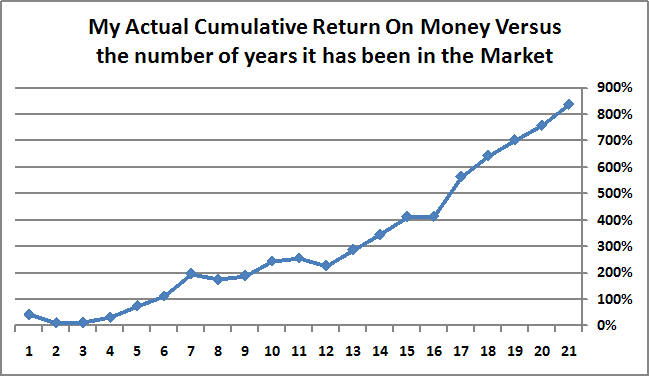InvestorsFriend Inc. Newsletter December 8, 2009
My Investment Performance
As an investment newsletter writer, it seems to me to be important that I reveal my own investing success.
The fact is that my personal investment results have been very good.
And 2009 has been an exceptionally good year.
The biggest earner in my house this year is not me and it’s not my wife. It’s our money! (Unfortunately or fortunately, it’s not money we can spend as it is almost all RRSP money)
One of our two RRSPs is up 49% this year. If we look at the return on the total dollars that we invested, it is even more impressive. This RRSP has earned $1.54 this year alone for every dollar ever invested in it!! In other words on an historic cost basis (as opposed to a market value basis) this RRSP is up 154% this year. Our other RRSP is up 27% this year on a market value basis and 83% on an historic cost basis.
Here is a graphical picture of our cumulative earnings on money invested each year since we started investing 21 years ago.

The graph shows the following:
The money I invested 1 year ago is up about 40%
The money I invested 2 and 3 years ago is not up much at all (thanks to the crash of 2008)
The money I invested 6 years ago has now doubled
The money I invested 7, 8 and 9 years ago has about tripled (up 200%)
The money I invested 15 and 16 years ago is up 400%
The money I invested 21 years ago is up over 800% Unfortunately I was just starting out investing and so the amount I invested 21 years ago was just $2,000. But that is worth over $16,000 today.
And note that my overall average compounded return on the money invested 21 years ago is 11.3%. That’s a good return. But it’s not spectacular or unbelievable or anything like that. A good return will grow money quite spectacularly when the time frame gets over 20 years.
The graph above illustrates that rather than timing the market, what is really important is Time In the Market. It’s extremely unlikely that you will make 300% in a year. But in a couple decades it’s easy to do.
Defining Financial Independence
One definition of financial independence is that it would be reached when you have enough investment assets that the return on your investments is as large as a a “good salary”. Such a financially independent person would be able to quit their job and still have a “good salary” coming in the door.
The following section discusses how it might be possible to reach the point where your money is making the equivalent of a “good salary”.
When Your Money Makes More Than You Do.
Imagine a person making $50,000 per year. Assume 5% or 2500 per year is invested. Assume an 8% return.
The result after 8 years is a portfolio of $31,219. What is interesting is that at 8% the return on that would be $2,500. So, in just eight years your money is now contributing as much to the pot as your annual contribution.
If you can keep this up for 39 years then at that point your portfolio would be $647,647. And the return on that at 8% would be just over $51,811. Remember this assumed your salary was $50,000 per year. So in this example, your money is eventually making more than you do.
Now imagine you are in a Defined Benefit type pension plan. You contribute5% of you salary and your employer also contributes 6%. Now we have a $50,000 salary and $6000 per year invested. Assume the same 8% return.
Now, after 29 years this money would be earning about $50,000 per year. After 29 years it earns more per year than its owner does.
Basically this shows that Freedom 55 is still a possibility. It would take a savings of probably 12 to15% or more of salary (including an employer funded portion) and it would take getting a good return on money. But it is possible.
The point is that it is possible for an investor to get to a point where his money earns more than he does. It’s a nice place to be.
I’ve gained temporary residence to such a place this year myself. But it took a 40% return to do it. I won’t likely be in that place next year but I am almost sure to be there again in a few years and before too many years can realistically hope to take up permanent residence there.
Is the U.S. Stock Market Over-Valued at this Time?
We have just updated our popular article that analyses whether or not the S&P 500 index is over-valued or not. Click to see the results.
END
Shawn Allen, President
InvestorsFriend Inc.
To see older editions of this newsletter, or to get off of this email list, click here.